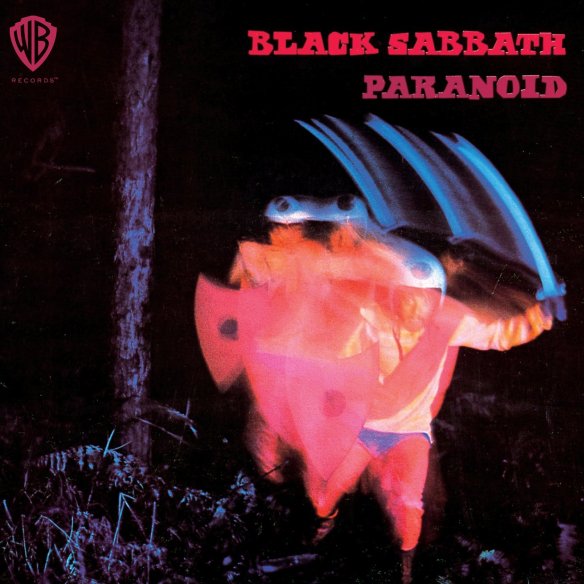With bands taking so much time between studio albums these days, it’s astonishing to believe that in the space of just three years, between 1970 and 1973, Brummie icons Black Sabbath released no less than five of the most important records in the annals of heavy metal.
Released fifty(!) years ago, just seven months after their genre-defining self-titled debut, Paranoid (Vertigo) might not be looked upon by some with quite the same reverence as its historic predecessor, yet it still remains one of the most significant releases in rock history. Stripped of cover versions, Paranoid stands as the first whole and entirely Black Sabbath album. An early monument to a band already growing in confidence and talent, and already moving away from the occult leanings of the debut, dealing instead with more serious and earthly issues such as drug abuse, politics and war. As well as giant metal spacemen and dancing dwarves, obviously.
At one point set to be the album’s title, the anti-war classic ‘War Pigs’ opens the record just as ominously as the gloomy, rain-soaked dread of the debut. A portentous riff and the grim sound of air raid sirens burst into life with a quick change of tempo and the unmistakable voice of Ozzy Osbourne rhyming “masses” with “masses” without actually sounding stupid. There aren’t many perfect songs in metal, but War Pigs is one of them. Or, bizarrely, if you lived in the US at the time, two of them, as the outro was handed the cryptic name of ‘Luke’s Wall’, giving the sneaky appearance of more songs.
Written in under half an hour, the three-minute title track went from being an afterthought to effectively becoming Sabbath’s signature tune, despite the band’s claims that none of the members knew what the word even meant. An almost mandatory staple of heavy metal compilation albums over the years, the song remains in frequent use to this day, appearing in films like Kong: Skull Island, Suicide Squad, and even The Angry Birds Movie.
The subdued, Leslie speaker trippiness of ‘Planet Caravan’ follows, a relaxing sojourn into mild psychedelia boasting a beautiful, bluesy solo from guitar maestro Tony Iommi. ‘Iron Man’ opens with a single stomping bass drum, a distorted and bent open E string, and Ozzy shouting “I am Iron Man!” into a metal fan. Then Iommi comes in with that riff and the rest is history.
Side Two (yes, things used to have sides) opens with the nuclear nightmare of ‘Electric Funeral’ before turning its attention to drug abuse and the psychological fallout of war with the equally powerful ‘Hand of Doom’. A song which, despite its overall bleakness, still manages to perfectly capture drummer Bill Ward‘s jazzy, swing technique.
Ward owns the instrumental ‘Rat Salad’ with a tasty extended drum solo before the album ends with the bizarrely titled ‘Fairies Wear Boots’. Another song split into two parts for the US, the intro was given the equally odd title of ‘Jack the Stripper’, again to give the cheeky illusion of extra songs.
Featuring some of Geezer Butler‘s finest wandering basslines, the song also includes one of the most perfect Sabbath moments ever when Ozzy appears to completely forget how to write a last line for the final verse, simply finishing with an appropriately stoned “yeeeeaaaahhhh!”. Originally stating at least part of the song was written about LSD, the famously sober frontman admitted later that he couldn’t actually remember what it was about at all.
It’s at this point where I feel we need to take a moment to be thankful we live in a world where Ozzy Osbourne can write a song about drugs, but having taken so many drugs over the years is unable to remember if the song he wrote about drugs was definitely about drugs.
My all-time #1 Black Sabbath album, it cannot be overstated just how important this album was during my teenage years. While school music classes were teaching me to shake maracas, blow unsuccessfully into a kazoo, or showing me how to drag a little stick over that scraper thing, Paranoid was changing my – and many others – entire perception of music.
GARY ALCOCK

